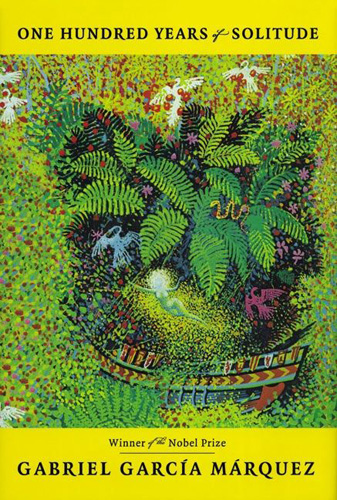Repeated family names can be fun and meaningful and hold lots of tradition. They can honor someone from the past or the present. They can represent a consistent thread in a line of people. They can also be a complete nightmare in a book.
Thankfully, my copy of “100 Years of Solitude” by Gabriel Garcia Marquez contained a handy family tree at the front so that every few pages I could flip back and remind myself just exactly which Jose Arcadio was being discussed.
In real life, this isn’t a problem since we have life spans and in a given family you’re likely to only know so many people with the same name. Plus you have the advantage of actually knowing them and seeing faces, which help immensely. Characters on a page, no matter how well described, have an extra layer of detachment. For example, Marquez very nicely differentiates brothers Aureliano Segundo and Jose Arcadio Segundo as one being a big hulking nice guy and the other a skinny little evil dude. But every time I saw their respective names I went through the process of mentally adding those descriptions in parentheses so I was sure which was which.
And despite all of that extra effort keeping everyone straight, this is absolutely an amazing book. It describes generations of the Buendia family with the individual and collective rises and falls from greed, ambition, creativity and spiritual power. I would estimate roughly half the characters are ones I actively rooted against, mostly the knucklehead boys that populate all branches of the Buendia tree.
There are changes in time, suspension of natural laws of physics and the need to buy into the possibilities beyondwhat our eyes see. But Marquez sucks you into the world he creates and forces that suspension of belief to the point it seems all too natural by the middle of the book.
He also describes me perfectly anytime I order a hot chocolate.
“The boy who had helped him with the mass brought him a cup of thick and steaming chocolate, which he drank without pausing to breathe. Then he wiped his lips with a handkerchief that he drew from his sleeve, extended his arms, and close his eyes. Thereupon Father Nicanor rose six inches above the level of the ground.”
Unlike Father Nicanor, I do not usually collect money for construction projects after this feat, but maybe I should.
Amid the scheming of the younger generations and the relentless decades of hard work by the matriarch of the family, Ursula, there is a lot of wisdom in the pages. Like when Fernanda loses a ring and Ursula uses her powers of observation to realize that everyone around her goes through basically the exact routine with the same steps each day, and figures out exactly where the ring is.
“Fernanda, on the other hand, looked for it in vain along the paths of her everyday itinerary without knowing that the search for lost things is hindered by routine habits and that is why it is so difficult to find them.”
Think about your own days for a second. Routines are great in that they can be efficient, but what do we lose by walking those same paths every day?
I highly recommend this book, but before you walk away with your copy please check the front for a family tree. I promise it will make the read soooooooooooooooo much smoother.
